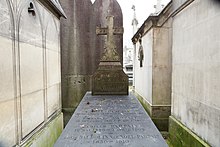Noël Parfait
He opposed the July Monarchy and appeared three times in court for his pamphlets against the regime, entitled Les Phillipiques (1832–1834).
In May 1833, he published L'aurore d'un beau jour: épisodes des 5 et 6 juin 1832, a call to insurrection which resulted in a two-year prison sentence and a 500 franc fine.
[4][5] In 1848, he became commissioner of the provisional government in Chartres and was elected a deputy of Eure-et-Loir from 1849 to 1851, sitting as part of the republican group, La Montagne.
He became a proof-reader for the publisher Michel Lévy and as such corresponded with Gustave Flaubert on the subject of his novel L'Education sentimentale, pointing out to him faults in style.
After a funeral in the Sainte-Clotilde basilica, he was buried in Paris in the Père Lachaise Cemetery (55th division),[2][9] along with other family members including his son-in-law, the painter Eugène Baudouin.



